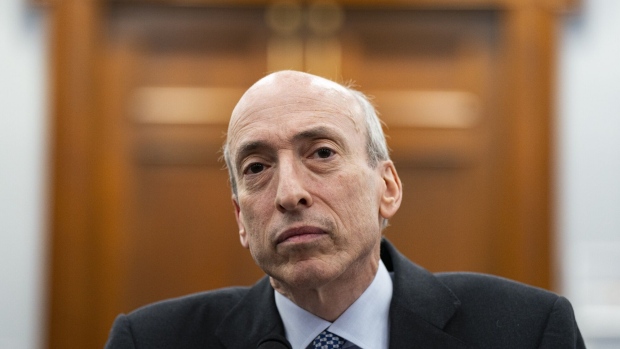Jul 11, 2023
Gensler Claims More Crypto Turf in Washington as Dissent Dithers
, Bloomberg News

(Bloomberg) -- Gary Gensler’s Securities and Exchange Commission is filling the crypto regulatory void, and the industry and its backers on Capitol Hill have so far been unable to check him.
The tide was supposed to turn when Republicans gained control over the House last November. Finally, the thinking went, there would be restraints on the SEC chief.
Yet after six months of hearings, initial plans and fiery statements about regulatory overreach, GOP lawmakers have yet to formally introduce their key proposals. The 2024 campaign season is about to kick into gear, and that means less time to debate complex policy issues and garner support from Democrats, who control the US Senate.
“Even if they do pull a rabbit out of the hat and get this out of the committee in a bipartisan way, get this to a floor vote, get it out of the House, there’s still going to be a significant hurdle to overcome with the Senate,” said Ron Hammond, director of government relations at the Blockchain Association, a crypto trade group.
Although the SEC faces significant challenges in court, its power over the asset class appears to be growing. In the absence of new legislation, the watchdog keeps asserting jurisdiction and claiming the industry must abide by its strict investor-protection rules.
Wall Street’s main regulator has signaled that it considers everything from crypto trading platforms to the vast majority of tokens as under its authority. The agency has recently sued two of the largest crypto exchanges, casting a cloud over the entire industry. The SEC also keeps thwarting plans for a Bitcoin exchange-traded fund and has sought sway over stablecoins.
Overreach?
Crypto backers argue that the SEC’s approach is mistaken and an overreach. They say many tokens are technically commodities under US rules and shouldn’t be subject to onerous — and expensive — SEC regulations.
Hopes for a pullback have been pinned largely on a plan from Patrick McHenry, a North Carolina Republican who leads the House Financial Services Committee, and Agriculture Committee Chairman Glenn Thompson, a GOP lawmaker from Pennsylvania. Their panels may advance the measure later this month. A draft of that bill calls for more clearly delineating when digital assets are commodities or securities, meaning the SEC could have less discretion and more assets would likely be overseen by the Commodity Futures Trading Commission.
Industry advocates generally prefer their assets to be regulated by the CFTC, which they view as being more flexible and willing to work with the industry. The derivatives regulator has said, however, it would be a tough overseer, pointing to the dozens of enforcement actions it brought against the sector.
Under the McHenry-Thompson plan, a token’s classification would depend largely on whether the blockchain network it’s affiliated with is sufficiently decentralized. The bill would also offer a pathway for assets that begin as securities to eventually be regulated as commodities, and require the SEC to modify rules to better accommodate crypto trading platforms.
Despite the industry support, the outlook dimmed when House Financial Services Committee’s top Democrat, Maxine Waters, recently said she has concerns about the proposal, which was initially drafted without input from Democrats. “Any bill would so dramatically overhaul our nation’s capital markets must be worked on collaboratively with the minority,” she said.
That’s a bad omen for attracting Democratic support, especially where it’s most needed in the Senate.
20% Chance
Waters also said it’s imperative for policymakers to first consult with Treasury Secretary Janet Yellen and the SEC’s Gensler. A blessing from the SEC chief is unlikely as he’s said that existing rules are adequate and digital-asset firms just refuse to follow them.
Alex Grieve, a lobbyist for crypto companies at Tiger Hill Partners, gives the legislation just a 20% chance of becoming law this year unless Republicans can sway a significant number of Democrats. The level of bipartisanship “dictates whether the Senate decides to sit up and take notice,” he said.
In another problematic sign, the Senate Banking and Agriculture committees have been far less engaged than their House counterparts. The panels have only held one hearing on crypto this year, combined.
Senator Sherrod Brown, the chairman of the Banking Committee, has also signaled he broadly supports the SEC’s current role. He told Bloomberg News in a statement that there are abuses in the crypto industry that must be addressed, and he’s considering proposals from colleagues, as well as engaging with regulators.
Quick Turnaround
Even with the hurdles, the industry’s backers haven’t given up. There are promising conversations between Republicans and Democrats, said Brett Quick, head of government affairs for the Crypto Council for Innovation.
The main issue is timing. “It’s a quick turnaround to make sure that both sides feel a part of the process and that they’ve had an opportunity to contribute their priorities and see modifications to the original text,” she said.
One potential area of agreement could be on crypto stablecoins, which lawmakers from both parties have seized upon as a potential unregulated threat to financial stability. Waters, for example, has said she looked forward to negotiating with Republicans on a plan.
©2023 Bloomberg L.P.





